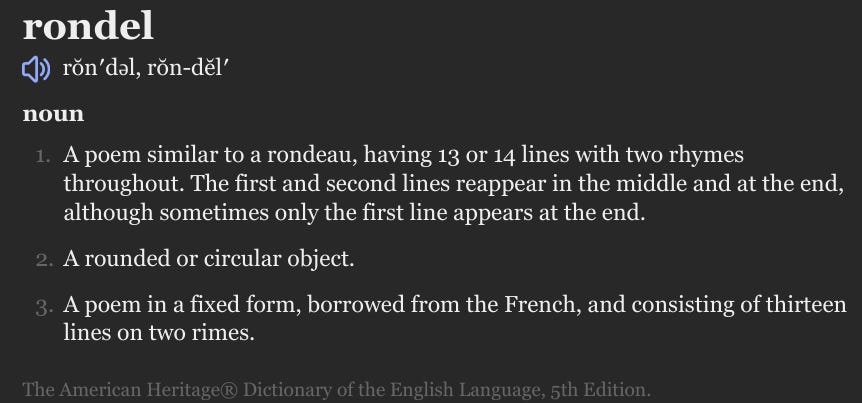MacDonald-specific posts can be found here and may be subscribed/unsubscribed separately from my main newsletter here.
Two Rondels I. 1 When, in the mid-sea of the night, I waken at thy call, O Lord, The first that troop my bark aboard Are darksome imps that hate the light, 5 Whose tongues are arrows, eyes a blight– Of wraths and cares a pirate horde– Though on the mid-sea of the night It was thy call that waked me, Lord. Then I must to my arms and fight– 10 Catch up my shield and two-edged sword, The words of him who is thy word– Nor cease till they are put to flight; Then in the mid-sea of the night I turn and listen for thee, Lord. II. 1 There comes no voice from thee, O Lord, Across the mid-sea of the night! I lift my voice and cry with might: If thou keep silent, soon a horde 5 Of imps again will swarm aboard, And I shall be in sorry plight If no voice come from thee, my Lord, Across the mid-sea of the night. There comes no voice; I hear no word! 10 But in my soul dawns something bright:– There is no sea, no foe to fight! Thy heart and mine beat one accord: I need no voice from thee, O Lord, Across the mid-sea of the night.
— George MacDonald, Poetical Works, Vol II.
As mentioned last Sunday, Robert Lous Stevenson praised MacDonald’s “Two Rondels.” Last week was the first half of the set, and this week completes it. They were published as a set, and the second continues the thought begun in the first.
If you’re familiar with MacDonald’s biographies and some of the critical work, you know that MacDonald had fun with naming things, puns, dual meanings, and so on. That he titled this set of poems as “Two Rondels” is possibly a pun on what a rondel is:
These are two 13-14 line poems with two rhymes. But a rondel, when paired sounds like it is also referencing armour. A rondel is the round shoulder guard of armour, which protects a narrow window of vulnerability—the armpit.

Given the first rondel, lines 9-11, “Then I must to my arms and fight–Catch up my shield and two-edged sword, The words of him who is thy word” This is a set of poems about spiritual warfare: “sword of the Spirit, which is the word of God.” (Eph 6:17)
So—to take some interpretive liberty— if we have the Breastplate of Righteousness, Helmet of Salvation, Shield of Faith, these are the rondels which defend the soul from the midnight pirate attacks of the mind — the imps of the logismoi — and swing with the Word as one might, it leaves one exhausted in the “mid-sea of the night.”
The logismoi is a category of thought—intrusive thoughts:
When the Fathers speak of `thoughts' (logismoi), they do not mean simple thoughts, but the images and representations behind which there are always appropriate thoughts. The images with the thoughts are called logismoi. "Images in some cases appear to take on visible form, while others are mostly products of the mind, but more often it is a combination of the two. As visible images also generate some thought or other, ascetics label all images `intrusive thoughts'" (388). The various satanic thoughts sometimes use as their vehicle what the senses bring to the nous, sometimes they mobilise fantasy and disjointed memory, and they attack the person with the ulterior aim of effecting his capture.1
So in this context, “darksome imps that hate the light, Whose tongues are arrows, eyes a blight—Of wraths and cares a pirate horde” are the “flaming darts of the evil one” in Eph 6:16. The poet, having defended against the darts, presumably with the shield of faith (the poet is awoken by the call of the Lord, and addressing throughout), and driven the wraths and cares out with the sword of the spirit—the Word. What then, after the attack of the mind? what is there? The opposite of the logismoi is the nous.
Fr Romanides:
The Fathers took the traditional term nous, which means both intellect (dianoia) and speech or reason (logos), and gave it a different meaning. They used nous to refer to this noetic energy that functions in the heart of every spiritually healthy person.2
The nous as the Fathers use it, “functions in the brain as the reason; it simultaneously functions in the heart as the nous. In other words, the same organ, the nous, prays ceaselessly in the heart and simultaneously thinks about mathematical problems, for example, or anything else in the brain.”3
The nous, is the prayer of the heart—separate from the intellect, but is the pure-will-
The nous itself, which is not simply the thoughts, but the subtler attention, should return to the heart, to the essence of the soul, which is located, as in an organ, within the bodily organ of the heart, since this bodily organ is the seat of intelligence and "the first intelligent organ of the body". Thus we should concentrate our nous, which is scattered abroad by the senses, and bring it back again "to the selfsame heart, the seat of thoughts"4
“in church I would rather speak five words with my mind, in order to instruct others, than ten thousand words in a tongue.” (1 Cor 14:19). “Mind” as used here is roughly equivalent to nous: not exclusively the reasoned intellect of but the heartbeat of our will that is made in the image of God, and in opposition to the logismoi.
There is a prayer in the Eastern tradition for this called The Jesus Prayer, which is used as a way of “praying without ceasing.” Through full-bodied prayer—usually breathing exercises— this prayer directs one’s mind towards the nous and away from the logismoi. Romanides notes “in Greek, the Prayer of Jesus consists of exactly five words in its simplest form, which in English is translated as Lord Jesus Christ, have mercy on me.”5 To pray this is one application of St Paul: repeating five words in order to better enable a prayer of the heart, rather than ten thousand words extemporaneously.
In the catholic contemplative tradition, the closest analogue to this is the Centring Prayer, popularised by Thomas Keating, and written well of by Martin Laird in his trilogy on contemplative prayer: Into the Silent Land, A Sunlit Absence, and An Ocean of Light. In this method, as in mindfulness meditation, one clears one’s thoughts, and focuses on a centring word or concept (“Lord” or “Grace” or, in the case above, the five words of the Jesus Prayer), training the mind to acknowledge the intrusive thoughts, both from the body (my toe hurts; what’s that sound) as well as the logismoi (flashing image-thought of a painful past event, or current ‘need to do that’ thought), and focusing again on the centring thought: Lord Jesus Christ, have mercy on me.
“Search inside yourself with your intellect so as to find the place of the heart, where all the powers of the soul reside.” — St. Symeon the New Theologian, The Three Methods of Prayer
This prayer, when prayed in either Eastern Hesychastic or Western Contemplative tradition, is a prayer of the heart: its product is inner stillness. The heart of God and the heart of man are brought into greater harmony.
“Prayer of the heart” occurs when the Prayer moves from merely mental repetition, forced along by your own effort, to an effortless and spontaneous self-repetition of the Prayer that emanates from the core of your being, your heart. You discover that the Holy Spirit has been there, praying, all along. Then heart and soul, body and mind, memory and will, the very breath of life itself, everything that you have and are unites in gratitude and joy, tuned like a violin string to the name of Jesus.6
Let us return to MacDonald’s second rondel:
There comes no voice; I hear no word! 10 But in my soul dawns something bright:-- There is no sea, no foe to fight! Thy heart and mine beat one accord: I need no voice from thee, O Lord, Across the mid-sea of the night.
As the poet has fought the logismoi pirates, his heart, continually tuned to listening for the voice of God, he realises that because of that pursuit a voice is not needed, for his heart has been drawn in to the serene stillness of Joy in the spirit. No voice is needed, as he is communing with the Lord in the very act of pursuit, and the voice of God does not respond in words but in kind with the Poet’s desire for Him: the Lord has been there, is there, and there are no enemies to fight when one is resting in Him.
Given all of this, perhaps these two rondels are the substance which follows 6:17: “Pray at all times in the Spirit, with all prayer and supplication. To that end keep alert with all perseverance, making supplication for all the saints” (Eph 6:18). I would suggest the Rondels of Stillness.
{ιμκ☩}
Hireotheos Vlachos, Orthodox Psychotherapy
John Romanides, Patristic Theology
Ibid.
Hireotheos Vlachos, Orthodox Psychotherapy
John Romanides, Patristic Theology
Frederica Matthewes-Green, The Jesus Prayer: The Ancient Desert Prayer that Tunes the Heart to God






